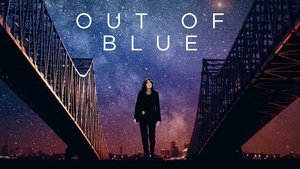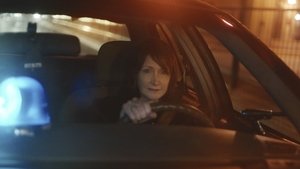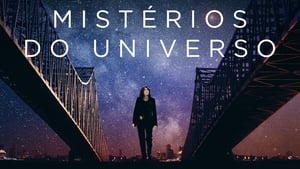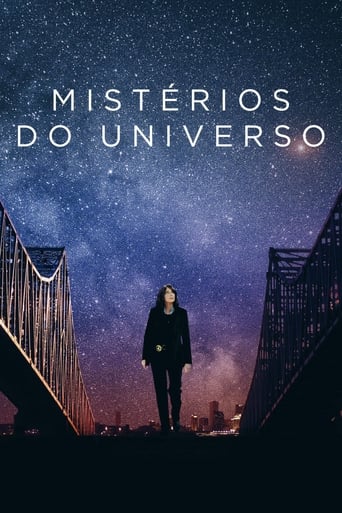
Out of Blue
Can you explain your place in the Universe?
2019 | 110m | English
Popularity: 2 (history)
| Director: | Carol Morley |
|---|---|
| Writer: | Carol Morley, Martin Amis |
| Staring: |
| Mike Hoolihan is an unconventional New Orleans cop investigating the murder of renowned astrophysicist Jennifer Rockwell, a black hole expert found shot to death in her observatory. As Mike tumbles down the rabbit hole of the disturbing, labyrinthine case, she finds herself grappling with increasingly existential questions of quantum mechanics, parallel universes, and exploding stars. The hunt for a killer draws a detective into an even larger mystery: the nature of the universe itself. | |
| Release Date: | Mar 22, 2019 |
|---|---|
| Director: | Carol Morley |
| Writer: | Carol Morley, Martin Amis |
| Genres: | Drama, Crime, Mystery |
| Keywords | based on novel or book, new orleans, louisiana, murder investigation |
| Production Companies | BBC Film, BFI, Cannon and Morley Productions, Lipsync Productions, Independent, Electric Shadow Company, Ellenglaze Films |
| Box Office |
Revenue: $17,682
Budget: $0 |
| Updates |
Updated: Feb 01, 2025 Entered: Apr 13, 2024 |
| Name | Character |
|---|---|
| Patricia Clarkson | Det. Mike Hoolihan |
| Toby Jones | Prof. Ian Strammi |
| Mamie Gummer | Jennifer Rockwell |
| Aaron Tveit | Tony Silvero |
| James Caan | Col. Tom Rockwell |
| Alyshia Ochse | Laurel Ann Rockwell |
| Yolonda Ross | Janey Mac |
| Tenea Intriago | Lucy |
| Devyn A. Tyler | Stella Honey |
| Jonathan Majors | Duncan J Reynolds |
| Hakim Callender | Sergeant James Monroe |
| Jacki Weaver | Miriam Rockwell |
| Lucy Faust | Ruby |
| Gary Grubbs | Mr. Torby |
| Thomas Francis Murphy | Slick |
| Brad Mann | Walt Rockwell |
| Liz Elkins Newcomer | Wendy Tempelton / Newspaper Woman |
| Bri Collins | Sabrina White |
| Todd Mann | Bray Rockwell |
| Deneen Tyler | Officer Caroline Herschell |
| Elizabeth Pan | Dr. Hi |
| Brenda Currin | Nancy the Waitress |
| Jenn Foreman | Jocelyn / Dancer |
| Carol Sutton | Miss Tolkington |
| Garrett Kruithof | Brian |
| Evangeline Hill | Young Mike |
| Name | Job |
|---|---|
| Carol Morley | Director, Writer |
| Martin Amis | Novel |
| Clint Mansell | Original Music Composer |
| Conrad W. Hall | Director of Photography |
| Matis Rei | Sound Effects Editor |
| Alex Mackie | Editor |
| Stacey Perry | Key Makeup Artist |
| Denise Templeton | Art Department Coordinator |
| Andrew Hartsock | Graphic Designer, Property Master |
| Reno Cicero | Compositor |
| Jacqui Marchant-Adams | Visual Effects Coordinator |
| Andrew Fineberg | Visual Effects Editor |
| Andy Quinn | Visual Effects Supervisor |
| Amy Krebsbach | Tailor |
| Peggy Donovan | Truck Costumer |
| Kathryn Castles | Script Editor |
| Gonzalo Gonzalez | Best Boy Electric |
| Dan Wyssmann | Best Boy Grip |
| Richard T. Hoover | Dolly Grip |
| Shaheen Baig | Casting |
| Jane Levick | Production Design |
| James A. Gelarden | Art Direction |
| Claire Sanchez | Set Decoration |
| Abby O'Sullivan | Costume Design |
| Leah Vautrot | Makeup Department Head |
| Heriberto Penche | Digital Compositor |
| Manuel Mendes | VFX Editor |
| Lee Pierce | Extras Casting |
| Brent Caballero | Location Casting |
| Allen Parks | Gaffer |
| Jimi Ryan | Key Grip |
| Rob 'Church' Rosales | Lighting Technician |
| Steve Acheson | Steadicam Operator |
| Skip Bolen | Still Photographer |
| Jeff Galpin | Stunt Coordinator |
| David Boulton | ADR Mixer |
| Beau Emory | ADR Mixer |
| Aaron Southerland | ADR Mixer |
| Justine Baker | ADR Recordist |
| Ian Waggott | Foley Artist |
| Ben Cross | Foley Mixer |
| Stephen Griffiths | Sound Designer |
| Michael Russo | Sound Mixer |
| Robert Farr | Sound Re-Recording Mixer |
| Brian Gilligan | Sound Re-Recording Mixer |
| Tim Hands | Supervising Sound Editor |
| Justin DeLong | Colorist |
| Tom Russell | Colorist |
| Michael Hopkins | Digital Intermediate |
| Aggela Despotidou | First Assistant Editor |
| Andrew Jon Wallace | First Assistant Editor |
| Claire Skowronek | Production Manager |
| Ashley Wright | First Assistant Director |
| Kat Hess | Second Assistant Director |
| Justin Meriwether | Leadman |
| Alejandra Tovar | Assistant Property Master |
| Keith Wall | Assistant Property Master |
| Shannon Jantz | Costume Supervisor |
| Darren Crisp | Production Coordinator |
| Ruth Kesler | Production Coordinator |
| Kevin Pratt | Production Secretary |
| Lauren Silver | Production Accountant |
| Met Salih | Stunt Coordinator |
| Holly O'Quin | Stunts |
| Name | Title |
|---|---|
| Luc Roeg | Producer |
| Cairo Cannon | Producer |
| Gary Giudice | Co-Producer |
| Peter Hampden | Executive Producer |
| Philip Herd | Executive Producer |
| John Jencks | Executive Producer |
| Norman Merry | Executive Producer |
| Maggie Monteith | Producer |
| Andrew Orr | Executive Producer |
| Cora Palfrey | Executive Producer |
| Jay Taylor | Executive Producer |
| Ben Roberts | Executive Producer |
| Organization | Category | Person |
|---|
Popularity History
| Year | Month | Avg | Max | Min |
|---|---|---|---|---|
| 2024 | 4 | 10 | 18 | 6 |
| 2024 | 5 | 12 | 18 | 7 |
| 2024 | 6 | 10 | 19 | 4 |
| 2024 | 7 | 12 | 27 | 6 |
| 2024 | 8 | 8 | 13 | 5 |
| 2024 | 9 | 6 | 12 | 3 |
| 2024 | 10 | 6 | 11 | 4 |
| 2024 | 11 | 5 | 9 | 3 |
| 2024 | 12 | 6 | 11 | 4 |
| 2025 | 1 | 7 | 14 | 4 |
| 2025 | 2 | 5 | 8 | 2 |
| 2025 | 3 | 4 | 7 | 1 |
| 2025 | 4 | 2 | 3 | 1 |
| 2025 | 5 | 1 | 3 | 1 |
| 2025 | 6 | 1 | 2 | 1 |
| 2025 | 7 | 0 | 1 | 0 |
| 2025 | 8 | 0 | 1 | 0 |
| 2025 | 9 | 1 | 2 | 1 |
| 2025 | 10 | 2 | 3 | 1 |
| 2025 | 11 | 2 | 4 | 1 |
| 2025 | 12 | 1 | 3 | 0 |
Trending Position
**_A clichéd, predictable, tonally inconsistent mess_** > _Somewhere in the universe two black holes collide - as heavy as stars, as small as cities, literally black (the complete absence of light) holes (empty hollows). Tethered by gravity, in their final seconds together the black holes course ... through thousands of revolutions about their eventual point of contact, churning up space and time until they crash and merge into one bigger black hole, an event more powerful than any since the origin of the universe, outputting more than a trillion times the power of a billion Suns. The black hol__es collide in complete darkness. None of the energy exploding from the collision comes out as light. No telescope will ever see the event._ - Janna Levin; _Black Hole Blues and Other Songs from Outer Space_ (2016) Part murder-mystery, part esoteric cosmological rumination, part metaphysical neo-noir, Carol Morley's _Out of Blue_ is a complete shambles. That this is so gives me no pleasure at all, as I'm a big fan of both _Dreams of a Life_ (2011) and _The Falling_ (2014). _Dreams_, in particular, was a seismic gut-punch of a movie, beautifully made, and thoroughly sobering. I saw Morley do Q&As for both films at the Dublin International Film Festival, and I've always found her to be articulate and insightful, so I was really looking forward to _Out of Blue_. Loosely based on Martin Amis's 1997 novel _Night Train_, the film wears its influences very much on its sleeve, primarily Nicolas Roeg (whose son, Luc serves as a producer) and David Lynch. Obviously designed as a puzzle, the story only ever seems half-formed, as if we're seeing it through gauze. Mixing tones, themes, and styles, the film tries to be many things at once, but ultimately ends up being none of them; far too simplistic to be a fully realised examination of the nature of existence, far too predictable to be a whodunnit, far too clichéd to be a noir. Set in New Orleans in an unspecified time period, the film begins with rising astrophysicist Jennifer Rockwell (Mamie Gummer), an expert on black holes and a proponent of the multiverse theory, giving a lecture on how humans are "_made of stardust_". The following morning, her body is found in the observatory in which she worked, shot three times. Homicide detective Mike Hoolihan (Patricia Clarkson), a recovering alcoholic who lives for the job, lands the case. As she starts investigating, she learns that Jennifer had become increasingly disturbed by the nature of her research into black holes. The daughter of Vietnam War veteran and wealthy businessman, Colonel Tom Rockwell (James Caan), and his wife, Miriam (Jacki Weaver), Jennifer had a fraught relationship with her parents, and many of her colleagues. Soon, Hoolihan has two main suspects; Jennifer's shifty and seemingly perpetually nervous boss, Professor Ian Strammi (Toby Jones) and her boyfriend/colleague, Duncan Reynolds (Jonathan Majors), who, upon finding out that Jennifer is dead, doesn't ask "how" or "when", but "why". The investigation will ultimately involve quantum mechanics, dark matter, string theory, Schrödinger's cat, and the double-slit experiment, as well as forcing Hoolihan to confront a childhood trauma she has repressed, of which the murder seems to be evoking flashbacks, and an unsolved serial killer case from the 1970s; the ".38 Killer", who always killed women that looked a lot like Jennifer. I haven't read the Amis novel on which the film is based, so I don't know if Morley has been successful in transplanting the tone to film, but irrespective of that, _Out of Blue_ attempts to connect the relative mundanity of human suffering to the vast unknowable mysteries of the universe. On the surface, this is quite similar to what Terrence Malick does in _The Tree of Life_ (2011). However, whereas Malick was essentially making the point that the birth of a galaxy is analogous with the birth of a child and that spirituality and science are not mutually exclusive, Morley sets our existence as a random and infinitesimal fragment in the impossible-to-conceive-of enormity of the universe. Although ostensibly set in a realistic _milieu_, the film has an undercurrent of Lynchian weirdness that seems to place it just ever so slightly outside normality, with Morley intermixing her larger metaphysical concerns with a mundane whodunnit. To be fair, she does give us clues that the murder investigation is not where the audience should be focused; for example, when Hoolihan first arrives at the crime scene, as a detective is briefing her, the sound fades out and the camera moves away, suggesting the details of the crime are irrelevant. However, this doesn't change the fact that the predictable outcome of the investigation has virtually nothing whatsoever to do with black holes and the multiverse, with the reveal of the killer seemingly overriding the film's more esoteric themes, in a manner which severely undercuts the presentation of those themes. Audiences will be left asking such questions as why is there so much information on Jennifer's research; is it all just an elaborate MacGuffin; is it simply that Morley was unable to find a way to dramatize it, thereby integrating the two strands of the film? The idea is obviously that in searching for the killer, Hoolihan is essentially discovering herself, played out against the backdrop of infinity, but the film never addresses why we should care, as it doesn't actually say anything interesting or significant about the connection between humanity and the strange goings-on of space-time. The quotidian nature of the whodunnit isn't helped by the fact that much of the acting is questionable, which seems unbelievable given the cast. Jackie Weaver appears to be in a completely different film to everyone else; James Caan is simply doing an imitation of John Huston in Roman Polański's _Chinatown_ (1974); Devyn A. Tyler as novice reporter Stella Honey, and Todd Mann and Brad Mann as Jennifer's creepy twin brothers never manage to escape the archetypal noir parameters of the characters they play; Yolanda Ross and Aaron Tveit, as Hoolihan's boss and colleague, respectively, are basically extras; even Patricia Clarkson struggles with breathing life into the material, although it's certainly unfortunate that the film is being released not so long after Karyn Kusama's infinitely superior _Destroyer_ (2018), in which Nicole Kidman gives a similar performance. Much of the problem, however, lies with Morley's script, rather than the actors. Essentially refusing to allow the audience any kind of emotional connection with the characters, Morley instead reduces the performances to shouting and clichés. There is one excellent scene in which Hoolihan gets drunk and takes off her clothes onstage at a strip club, and it's excellent because it's the one scene where Clarkson is allowed to engage with the audience at an emotional level, evoking both shock and pity. Even the always-excellent Clint Mansell (_Requiem for a Dream_; _Black Swan_; _Filth_) is off his game, with his score failing to provide much in the way of texture or nuance, and occasionally seeming to actively work against what we're seeing. On the other hand, the cinematography by Conrad W. Hall (_Panic Room_; _Olympus Has Fallen_) is excellent, flattening New Orleans in the background, and essentially creating an oppressive and generic geographical location that could be anywhere and is always just out of reach, something which works in tandem with Hoolihan's repressed memories. Hall also does some solid work during the flashbacks to Hoolihan's childhood. With the identity of the killer proving so banal (and just so predictable), the film essentially tasks its metaphysical component with doing all the heavy lifting, and this certainly does seem to be Morley's main concern. However, despite creating a dream-like narrative, always receding from the viewer, Morley can't cut loose of the shackles of genre, with the film's last act falling back on melodrama and unlikely coincidences. Ultimately, we're left with a film where nothing emerges fully formed. If it's really about Hoolihan's existential discovery of self, why is psychological nuance utterly absent? If it's a murder mystery, why is it so predictable and trite? If it's an esoteric rumination about eternity and the universe, why are so many of the necessary components presented in such a simplistic manner? Morley's themes and tones end up tripping over and undermining one another, as she singularly fails to integrate the metaphysical concepts with the murder plot. All in all, it's a misfire for a heretofore promising director.
Near as I can figure just about everybody hates this movie. Clearly expectations based on the novel were not met. I almost feel badly about not hating it. Oh well. I found the complex and subtle plot line to be intriguing, and I was therefore too caught up in the evocative camera work and the atm ... ospheric soundtrack to count the mistakes and perceived lapses in judgment that others found. Yes, I could have done without the little bits of film clips they threw in repeatedly: the marble or whatever it was rolling on the floor, the red scarf, and so on. There was no explanation that I could see and perhaps deserved to be on the cutting room floor, so to speak. And the ending was a bit too ambiguous for me, which probably was what they were aiming for, so congratulations to them on that front. The question of suicide vs. homicide reminds me of when I took philosophy classes in college and noticed how a few leading philosophers in the early days of science committed suicide, whether because they were addressing questions no one had thought about before, or uncovering uncomfortable answers, or some other emotional response to the deep investigation into the human condition. And I wonder, do physicists ride the same sort of emotional roller coaster as they delve closer to answers to the big questions of where the universe came from, or indeed, are there multiple universes? So anyway, I found Out of Blue to be entertaining, intriguing and thought provoking with a subject matter you rarely see explored in theatrical films, so I forgave its cinematic transgressions in other areas.


































